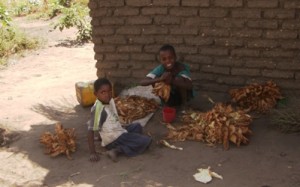THE QUANDARY OF TOBACCO BUSINESS AT THE AUCTION FLOORS
Published on March 21, 2011 at 10:49 AM by FACE OF MALAWI
 Culture is learnt in the family not inherited. This is why children from one family behave differently from others in the same village. Similarly, children from one village conduct themselves differently from those of other villages. That is what culture is all about. It is passed on from one generation t the next.
Culture is learnt in the family not inherited. This is why children from one family behave differently from others in the same village. Similarly, children from one village conduct themselves differently from those of other villages. That is what culture is all about. It is passed on from one generation t the next.
The same is true with the story of tobacco business in Malawi. The truth is that tobacco is not a traditional crop in Malawi. It was American Indians who began to grow tobacco after 1 BC as a medicinal plant to mitigate body pain and was chewed as breath refresher. Christopher Columbus introduced tobacco to Europe after his first exploration visit to America on 15th October, 1492.
In 1571, Dr Nicolas Monard, campaigned that tobacco the popularization of tobacco in Europe by claiming that it had over 36 different medicinal uses. There was a new twist in 1600; when tobacco was considered “green gold” in financial markets in both Europe and America. Consequently, the American Revolution in 1776 was financed by tobacco as French Banks accepted it as collateral. This explains why colonialism must be accepted as a kind of business enterprise. It was an expansionist strategy for more farmland to produce more tobacco and other crops.
To prove that tobacco was considered a strategic crop by the colonialist who introduced it in our country. Tobacco was enacted as a protected crop under the Special Crops Act by the colonial government and only to be grown on estate land. As a mutually reinforcement strategy, missionaries discouraged their followers from either growing or smoking tobacco. With hind-sight skeptics look at the contradiction of policies mutually reinforcing to discourage wide spread domestic use of the crop otherwise overzealous citizens would have discovered the intrinsic medicinal values in the crop. To every Malawian, tobacco is for export and smoking is sin before God.
What the colonialist did not do was to educate the Malawians about the behavior of international markets. This was their secret. International markets have their own dictates. The auction market disposal system was introduced to satisfy requirements of international buyers not farmers; to provide product quality inspection opportunities to the international buyers and also promote buying completion from as many players as possible.
Truthfully, the auction market disposal systems are not intended to benefit sellers. It is strange that tobacco farmers including important personalities want to fight with buyers at the auction floors for being offered lower than expected prices. Tobacco is a business and the best institution to intervene should have been the Reserve Bank not otherwise. The question to ask is what the market price is when the commodity is bought for export. The mechanism controlling auction markets worldwide are self-regulatory by their nature. They obey laws of supply and demand where the seller is reduced to price taker.. It does not matter whether the auction market is for used cars, tea, tobacco or minerals, the conduct is the same.
The story is different in secondary economies where oftentimes seller dictates prices. This is the dichotomy of trade. It is not stealing although African leaders find it easier to use unfair trade systems, international capitalism and its agents as some of the excuses for underdevelopment. Richard Dowden claims in his book; “Africa-Altered States—“ that the colonial legacy made African economies primary producers of raw materials while manufacturing was done in Europe.” Why did the colonialists choose to import raw materials instead of adding value to the raw materials at source?
The meaning of value adding is a process of converting a state of raw materials from one form to another. This process involves losses through waste. The operational losses are paid through speculation and price discounts. Therefore, it is unethical for anyone to allege that buyers at auctions cheat. It must be realized that when talking about fairness, the fairness must be relative.. Buyers cannot pay higher prices to cover inefficiencies, low productivity or political patronage. That is why politicization of trade must be avoided..
meaning of value adding is a process of converting a state of raw materials from one form to another. This process involves losses through waste. The operational losses are paid through speculation and price discounts. Therefore, it is unethical for anyone to allege that buyers at auctions cheat. It must be realized that when talking about fairness, the fairness must be relative.. Buyers cannot pay higher prices to cover inefficiencies, low productivity or political patronage. That is why politicization of trade must be avoided..
During the last seven years every citizen took part in the debate about establishing an export oriented economy. What was not realized is that changing an economy from one stage to another involves many things inter alia human resources, skill levels, branding, sanitation, transitional intermediaries and political will. Secondary industries require different kinds of workers who use brains. There is need for sanitation and branding for the products to be received in international markets. Most seriously, changing to a secondary economy would undoubtedly present political challenges to corrupt elected representatives who personalize use of public goods.
The fact is that tobacco farming was started by American Indians after 1 BC. Christopher Columbus introduced tobacco in Europe in October 1492. Auction markets the world over are for buyers to offer prices and cannot be fair to sellers. It can only be either greed, ignorance or politicking to extort higher prices from buyers when the same products are cheaper elsewhere. Buyers have the choice to relocate and buy elsewhere.
Shortcode [wp_announce_marquee]

